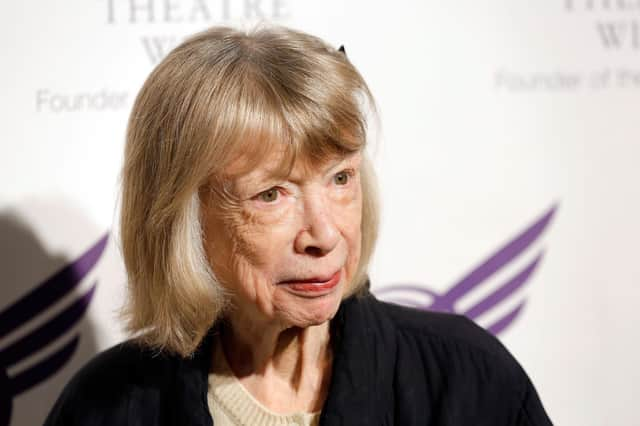From Scottish independence and Brexit to transgender rights, blind faith in dogma is replacing reasoned discussion – Susan Dalgety


Didion, a renowned American writer who died aged 87 two days before Christmas, wrote these words in the throes of the presidential campaign between Republican George H Bush and Democrat Michael Dukakis. More than a generation later, they apply equally to Scotland’s political and civil society establishment as they did to America’s political class of 1988.
Didion refers to this elite as a “self-created, self-referring class, a new kind of managerial elite, [they] tend to speak of the world not necessarily as it is but as they want people out there to believe it is”.
Advertisement
Hide AdAdvertisement
Hide AdShe added: “They tend to speak a language common in Washington but not specifically shared by the rest of us.”
For Washington read Holyrood as we emerge blinking into 2022. There, in the semi-circular oak-and-sycamore debating space, designed originally for consensual debate but now reduced to an echo chamber for the First Minister, we listen to Scotland’s “new kind of managerial elite” lecture us about a nation many of us do not recognise. A civil society whose code we do not understand.
Even as Omicron was burning through the country, Nicola Sturgeon insisted she was going to “initiate the process necessary to enable a referendum before the end of 2023”.
No-one, least of all the First Minister, believes there will be a fresh poll any time soon on whether Scotland should leave the UK, but her words were not for us, the little people in our tenement flats and our suburban homes.
They were for the “self-created, self-referring” class of Scots who believe that nothing – not a strong economy, tackling poverty, rebuilding the health service – matters more than independence.
Education will be the defining mission of her government, promised Sturgeon in 2016. Six years later and the gap between Scotland’s poorest children and their wealthier peers remains a matter of national shame. Is the First Minister embarrassed? Of course not.
Not even a scathing report by Audit Scotland last March, which showed that her mission had failed, could puncture her self-belief. Funding for schools has been rearranged to spread an already meagre pot more thinly, but education remains her self-declared priority, along with independence of course.
As we peer fearfully into the new year, the only thing that is certain is that the First Minister and her supporters in the civil service and civil society will continue to speak of our country, “not necessarily as it is but as they want people out there to believe it is”.
Advertisement
Hide AdAdvertisement
Hide AdNowhere is that more glaringly obvious than in the government’s determination to reform the 2004 Gender Recognition Act by allowing men and women to change their legal gender simply by declaring their new status, or self-ID as it is known. Currently a person requires medical approval to obtain a certificate that recognises the change.
In a few weeks’ time, the government is expected to publish its draft Bill. And despite concerns from within its own party and a growing grassroots campaign by women worried that self-ID is incompatible with current legal protection for women, the First Minister is determined to plough ahead.
She refuses to listen to the urgent voices of women, fearful that their hard-won, female-only spaces are about to be sacrificed. But on this matter, to echo Joan Didion, the First Minister speaks a language that, while it may be common to a small elite, is not shared by the rest of us.
Recent polls show that while most are happy for people to freely express their identity any way they wish, they do not support self-ID.
This is not about gender identity, argued author JK Rowling a few days ago. “The question at the heart of this debate is whether sex or gender identity should form the basis of decisions on safeguarding, provision of services, sporting categories and other areas where women and girls currently have legal rights and protections.”
And Scotland’s leading independent feminist policy team, Murray Blackburn Hunter, has helpfully published a package of reform options which will modernise the 2004 Act while keeping a medical check in place.
There has been much wringing of hands and earnest debate in recent years, both here and in America, about the failure of politics, the growth of populism, even the death of democracy. I think the answer lies partly in Joan Didion’s essay.
Truth is no longer based on empirical evidence, on what we can see, feel, hear, live. It is whatever our post-modern political elite want it to be.
Advertisement
Hide AdAdvertisement
Hide AdTrump made America great again. Brexit gave the NHS a weekly bonus of £350 million a week. There will be a second independence referendum in 2023. Biological sex, the basis of human evolution, is downplayed, while gender, a feeling in your brain, matters more.
The people who seek to represent all of us are no longer of us. They dismiss our concerns as not valid. Their reality is not ours. Nowhere is that more true than here in Scotland, ironically the epicentre of the 18th-century Enlightenment which stressed reason and logic over dogma.
Today, blind faith, whether it is in a second independence referendum or that a man accused of rape is a woman because he says so, is a test of citizenship.
Failure to believe is a sin. We are governed by people whose confected truth matters more than our lived experience. Happy New Year.
A message from the Editor:
Thank you for reading this article. We're more reliant on your support than ever as the shift in consumer habits brought about by coronavirus impacts our advertisers.
If you haven't already, please consider supporting our trusted, fact-checked journalism by taking out a digital subscription.
Comments
Want to join the conversation? Please or to comment on this article.
